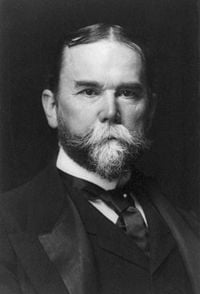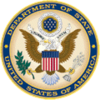Difference between revisions of "John Hay" - New World Encyclopedia
({{Contracted}}) |
Lindsay Hull (talk | contribs) |
||
| Line 71: | Line 71: | ||
* ''Poems'' | * ''Poems'' | ||
* ''Abraham Lincoln: A History'' (nine volumes, 1890) | * ''Abraham Lincoln: A History'' (nine volumes, 1890) | ||
| + | ==Notes== | ||
| + | <references/> | ||
| + | |||
==References== | ==References== | ||
| − | *[[Lorenzo Sears]] | + | * Clymer, Kenton J. ''John Hay: The gentleman as diplomat''. Ann Arbor: University of Michigan Press, 1975. |
| − | *[[Warren Zimmerman]] | + | *[[Lorenzo Sears|Sears, Lorenzo]]. ''John Hay, Author and Statesman'' (New York, 1914) |
| + | *[[Warren Zimmerman|Zimmerman, Warren]]. ''First Great Triumph: How Five Americans Made Their Country a World Power''. New York: Farrar, Straus and Giroux, 2002. | ||
== External links == | == External links == | ||
| − | + | *{{gutenberg author|id=John_Hay_(1835-1905)|name=John Hay}} Retrieved October 15, 2007. | |
| − | *{{gutenberg author|id=John_Hay_(1835-1905)|name=John Hay}} | + | *[http://www.mlwh.org/inside.asp?ID=20&subjectID=2 John Hay Biography] Retrieved October 15, 2007. |
| − | *[http://www.mlwh.org/inside.asp?ID=20&subjectID=2 John Hay Biography] | + | *[http://www.mrlincolnandfriends.org/inside.asp?pageID=94&subjectID=9 John Hay, Abraham Lincoln's Friend] Retrieved October 15, 2007. |
| − | *[http://www.mrlincolnandfriends.org/inside.asp?pageID=94&subjectID=9 John Hay, Abraham Lincoln's Friend] | ||
{{start box}} | {{start box}} | ||
| Line 104: | Line 107: | ||
{{USSecState}} | {{USSecState}} | ||
| − | [[Category: | + | [[Category:History]] |
| − | + | {{wikiquote}} | |
| − | |||
| − | |||
| − | |||
| − | |||
| − | |||
| − | |||
| − | |||
| − | |||
| − | |||
| − | |||
| − | |||
| − | |||
| − | |||
{{Credits|162656539}} | {{Credits|162656539}} | ||
Revision as of 20:27, 15 October 2007
- For other persons named John Hay, see John Hay (disambiguation).
| John Milton Hay | |
 | |
12th United States Assistant Secretary of State
| |
| In office November 1, 1879 – May 3, 1881 | |
| Preceded by | Frederick W. Seward |
|---|---|
| Succeeded by | Robert R. Hitt |
37th United States Secretary of State
| |
| In office September 30, 1898 – July 1, 1905 | |
| Preceded by | William R. Day |
| Succeeded by | Elihu Root |
| Born | October 8 1838 Salem, Indiana, U.S. |
| Died | July 1 1905 (aged 66) Newbury, New Hampshire, U.S. |
| Political party | Republican |
| Profession | Author, Journalist, Statesman, Politician, Secretary |
John Milton Hay (October 8, 1838 – July 1, 1905) was an American statesman, diplomat, author, journalist, and private secretary and assistant to Abraham Lincoln.
Life
Hay was born in Salem, Indiana, of Scottish ancestry,[1] raised in Warsaw, Illinois, and educated at Brown University (1858), where he joined Theta Delta Chi. In 1861 he was admitted to practice in the Supreme Court of Illinois.[2]He began his public career as a secretary to Abraham Lincoln at age 22, while technically a clerk in the Interior Department. At a time when most of Lincoln's cabinet were hostile to him[citation needed] and vying for position and influence, Hay served also as a friend, confidant and companion, as well as a performer of odd jobs. He lived in the northeast corner bedroom on the second floor of the White House. He shared that room with his fellow secretary John G. Nicolay, who was six years older.
For a few months, he served in the Union army under Generals Hunter and Gillmore. He rose to the rank of major and was later brevetted lieutenant colonel and colonel. [3] Hay's diary and writings during the Civil War are basic historical sources. Some have credited Hay with being the real author of President Lincoln's Letter to Mrs. Bixby, consoling her for the loss of her sons in the war.
Hay was present when President Lincoln died after being shot at Ford's Theatre. Hay and John G. Nicolay wrote a formal 10-volume biography of Lincoln (Abraham Lincoln: A History, 1890) and prepared an edition of his collected works.
Portions of Hay's diaries and letters from 1861–1870, published in the book Lincoln and the Civil War, show the President in a far more intimate light. The portrait of Abraham Lincoln is affectionate, certainly biased in Lincoln's favor, but also contains insights and anecdotes of the homely and humorous sort that Lincoln enjoyed.
Hay was named U.S. ambassador to the United Kingdom in 1897 when William McKinley became President. Some of the recognition of the longstanding community of interests between that country and the United States came as a result of Hay's stay there.[citation needed] In August 1898, Hay was named Secretary of State and helped negotiate the Treaty of Paris of 1898. Hay continued serving as Secretary of State after Theodore Roosevelt succeeded McKinley, serving until his own death in 1905.
His contributions included the adoption of an Open Door Policy in China (announced on January 2, 1900) and the preparations for the Panama Canal. He negotiated the Hay-Pauncefote Treaty (1901), the Hay-Herran Treaty (1903), and the Hay-Bunau Varilla Treaty (1903), all of which were instrumental clearing the way for the construction and usage of the Canal. In all he brought about more than 50 treaties, including the settlement of the Samoan dispute, as a result of which the United States secured Tutuila, with an excellent harbor in the Pacific; a definitive Alaskan boundary treaty in 1903; the negotiation of reciprocity treaties with Argentina, France, Germany, Cuba, and the British West Indies; the negotiation of new treaties with Spain; and the negotiation of a treaty with Denmark for the cession of the Danish West India Islands.[4]
In 1904, Hay was one of the first seven chosen for membership in the American Academy of Arts and Letters.
He is buried in Lake View Cemetery in Cleveland, Ohio.
Legacy
Hay is also renowned for his comment, written in a letter to President Theodore Roosevelt, describing the Spanish-American War as a "splendid little war."
Regarding a misunderstanding between Theodore Roosevelt and Mark Hanna, Hay had commented, "This wordy city poisons men, who might be friends, against each other" (from 'Theodore Roosevelt' by Henery F. Pringle, page 349.
Hay appears as a character in Gore Vidal's historical novels Lincoln and Empire. He appears, portrayed by John Huston, in the 1975 film The Wind and the Lion, a fictionalization of the Perdicaris Affair in Morocco in 1904. He is portrayed in the 1997 miniseries Rough Riders by actor and legendary United States Marine R. Lee Ermey.
Hay was a close friend of Henry Adams, American historian and author. Hay and Adams built homes next to one another on Lafayette Square in Washington, DC, designed by H.H. Richardson. That structure was demolished and the site is now occupied by the Hay-Adams Hotel, named in their honor.
Brown University's John Hay Library housed the entire library collection from its construction in 1910 until the John D. Rockefeller, Jr. Library was built in 1964. In 1971, when physical science materials were transferred to the new Sciences Library, the John Hay Library became exclusively a repository for the Library's Special Collections.
For more information regarding John Hay, read The Five of Hearts.
His daughter Alice Evelyn Hay married James Wolcott Wadsworth Jr. [5] Another daughter, Helen Julia Hay, married Payne Whitney, and they were the parents of John Hay Whitney and Joan Whitney Payson.
Books by Hay
- Abraham Lincoln: a History (with John G. Nicolay)
- The Bread-winners
- A Social Study
- Castilian Days (1875)
- Pike County Ballads and Other Poems (1871)
- Poems
- Abraham Lincoln: A History (nine volumes, 1890)
Notes
ReferencesISBN links support NWE through referral fees
- Clymer, Kenton J. John Hay: The gentleman as diplomat. Ann Arbor: University of Michigan Press, 1975.
- Sears, Lorenzo. John Hay, Author and Statesman (New York, 1914)
- Zimmerman, Warren. First Great Triumph: How Five Americans Made Their Country a World Power. New York: Farrar, Straus and Giroux, 2002.
External links
- Works by John Hay. Project Gutenberg Retrieved October 15, 2007.
- John Hay Biography Retrieved October 15, 2007.
- John Hay, Abraham Lincoln's Friend Retrieved October 15, 2007.
| Preceded by: Frederick W. Seward |
United States Assistant Secretary of State 1879–1881 |
Succeeded by: Robert R. Hitt |
| Preceded by: Thomas F. Bayard |
United States Ambassador to the United Kingdom 1897–1898 |
Succeeded by: Joseph H. Choate |
| Preceded by: William R. Day |
United States Secretary of State 1898–1905 |
Succeeded by: Elihu Root |
| |||||||
Credits
New World Encyclopedia writers and editors rewrote and completed the Wikipedia article in accordance with New World Encyclopedia standards. This article abides by terms of the Creative Commons CC-by-sa 3.0 License (CC-by-sa), which may be used and disseminated with proper attribution. Credit is due under the terms of this license that can reference both the New World Encyclopedia contributors and the selfless volunteer contributors of the Wikimedia Foundation. To cite this article click here for a list of acceptable citing formats.The history of earlier contributions by wikipedians is accessible to researchers here:
The history of this article since it was imported to New World Encyclopedia:
Note: Some restrictions may apply to use of individual images which are separately licensed.

